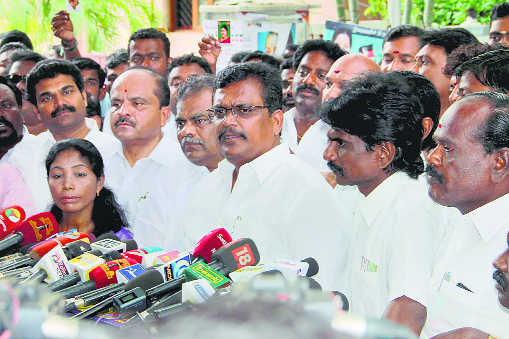
DEFECTION DRAMA: TTV Dinakaran and MLAs supporting him express no-confidence in Tamil Nadu Chief Minister K Palaniswami’s government in Chennai recently. PTI
Satya Prakash
Often invoked just before a trial of strength to manipulate numbers in a House, the anti-defection law is back in the news. On September 18, Tamil Nadu Speaker P Dhanapal disqualified 18 dissident AIADMK MLAs belonging to the TTV Dhinakaran faction after they withdrew support to Chief Minister E Palaniswami, bringing the effective strength of the House from 234 to 215. Now Palaniswami needs only 108 MLAs to survive.
Nothing appears to have changed since the dramas of defection in Arunachal Pradesh and Uttarakhand leading to constitutional crises in the states and judicial interventions, that gave partial solutions.
52nd Amendment
Terming defections by lawmakers as "a matter of national concern", the Rajiv Gandhi government introduced the 52nd Amendment to the Constitution to deal with "the evil of political defections." Tenth Schedule of the Constitution, which was added through the 52nd Amendment, talks of two circumstances when a member can be disqualified: one, if he/she voluntarily gives up membership of a party; two, when he/she votes (or abstains from voting) contrary to the directive issued by the party.
Many ifs and buts
But there are too many ifs and buts that make the law prone to misuse. The Supreme Court's 1994 ruling in the Ravi Naik versus Union of India case has made things worse for those who want to criticise their own party's policies while retaining membership of the House. "Even in the absence of a formal resignation from membership, an inference can be drawn from the conduct of a member that he has voluntarily given up his membership of the political party to which he belongs," said the top court in Ravi Naik's case.
JD(U) Rajya Sabha MPs Sharad Yadav and Ali Anwar can potentially fall foul of Tenth Schedule due to this interpretation of the law. On September 12, Rajya Sabha Chairman M Venkaiah Naidu issued notices to Yadav and Anwar asking why they should not be disqualified from the House after the Nitish faction complained that they had "voluntarily" quit the JD(U) by participating in RJD's August 27 rally.
Expelled MPs/MLAs bound by party whip
Ironically, if the JD(U) expels Yadav and Anwar, they can still retain their membership of the Upper House, thanks to the top court's ruling in the G Viswanathan versus Hon'ble Speaker, Tamil Nadu State Assembly (1996) that an expelled lawmaker is bound by his/her party's whip even after expulsion. Failure to obey the whip would result in his/her disqualification from the House, it said. "Paragraph 2(1) read with the explanation clearly points out that an elected member shall continue to belong to that political party by which he was set up as a candidate for election as such member. This is so notwithstanding that he was thrown out or expelled from that party," the SC ruled.
But in November 2010, the Supreme Court protected Samajwadi Party leaders Amar Singh and Jaya Prada from disqualification even if they disobeyed the whip of the party they were expelled from. The issue has since been referred to a larger Bench which has not been constituted yet.
Originally, the Tenth Schedule recognised a 'split' in a legislature party if at least one-third members formed a new group or joined another party. But, after the 91st Amendment of January 2004, the law recognises a 'merger' that requires at least two-third members of a party to join another party or form a new party without falling prey to the anti-defection law.
Speakers are ‘impartial’ arbiters
The Speaker has been assigned the role of an impartial arbiter. But the conduct of speakers has left much to be desired. A lawmaker elected as Speaker/Chairman is allowed to resign from his/her party, and rejoin it if he/she demits office. But speakers have invariably allowed themselves to be used for gain of their party or leader.
The Tenth Schedule says the Speaker's/Chairperson's decision on questions of disqualification on ground of defection shall be final and can't be questioned in courts. In Kihoto Hollohan vs Zachillhu and Others (1991), an SC Constitution Bench declared that the Speaker's decision was subject to judicial review.
The Tenth Schedule is more about the need to keep the flock together and check the 'Aaya Ram Gaya Ram' culture rather than principles. In fact, it runs counter to Articles 105 and 194 which guarantee free speech to MPs/MLAs in the House. But the top court chose to uphold it, saying, "The anti-defection law seeks to recognise the practical need to place the proprieties of political and personal conduct…above certain theoretical assumptions."
However, the anti-defection law does come in the way of a lawmaker expressing his independent views without fear of losing his seat. Should it be used only during confidence motions? The Dinesh Goswami Committee on Electoral Reforms (1990) and the Law Commission in its 170th Report in 1999 said parties should issue whips only when the government is in danger.
Following demands that disqualification not be decided by speakers as they failed to be impartial, the Dinesh Goswami Committee and the Constitution Review Commission headed by Justice MN Venkatachaliah (2002) had recommended such a decision be made by the President or the Governor on the Election Commission's advice, as in the case of disqualification on grounds of office of profit. Thus, it is clear that finding a legal solution to defections has failed and there is need to look beyond.



























